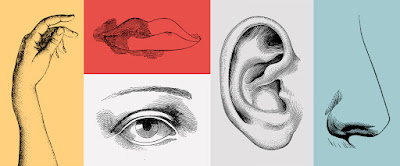Storytelling and The Sixth Sense

Storytelling and The Sixth Sense “ A story that makes sense is one that stirs the senses from their slumber, one that opens the eyes and the ears to their real surroundings, tuning the tongue to the actual tastes in the air and sending chills of recognition along the surface of the skin. To make sense is to release the body from the constraints imposed by outworn ways of speaking, and hence to renew and rejuvenate one's felt awareness of the world. It is to make the senses wake up to where they are,” (265, Abram). We look to the senses to tell us about the world around us, but what happens when those senses are being to us in writing? I find that the senses are most clearly depicted in work like poetry, especially prose. This semester was a semester of poetic exploration for me as I was working extremely heavily with the sense to display story. Although fairly abstract when we are experiencing them I have found that most people actually have an easier time identifying...












